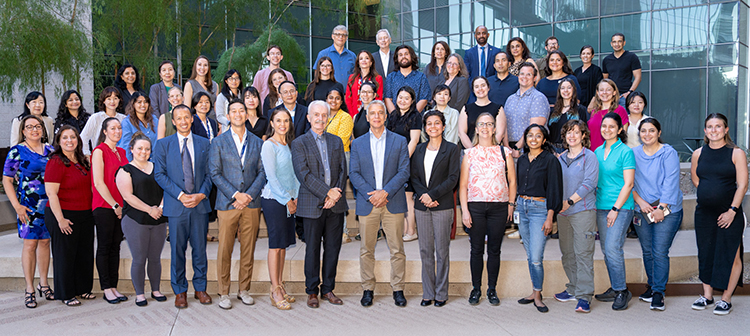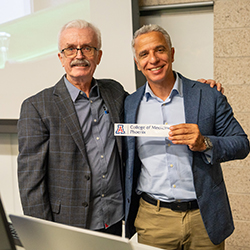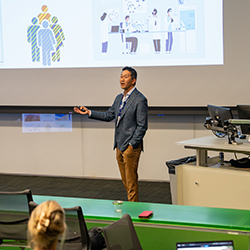Translational Cardiovascular Research Center Commemorates Fifth Anniversary

The Translational Cardiovascular Research Center (TCRC) serves as world-class research center, fostering collaboration between researchers at the University of Arizona College of Medicine – Phoenix and Banner – University Medical Center Phoenix.
To honor the fifth anniversary of the center, the U of A College of Medicine – Phoenix hosted a seminar celebrating the great strides the University of Arizona has made in translational research aimed at reducing the prevalence of heart disease in Arizona.
Christopher Glembotski, PhD, director of TCRC and vice dean for Research at the U of A College of Medicine – Phoenix, highlighted some of the achievements and growth of the TCRC since he started the center in September 2020.
“Center membership has grown considerably in these last five years. Membership is not limited to faculty in the College of Medicine – Phoenix but also includes University of Arizona College of Medicine – Tucson and Department of Physiology in Tucson, Phoenix Children’s, the VA Phoenix Health Care System and several other locations,” Dr. Glembotski said. “This broad membership fosters collaboration, like today’s seminar will hopefully do, too.”

In the last five years, the organization grew from just a few members to a group of about 32 people. Dr. Glembotski also stated that the TCRC comprises about a third of the funding from the National Institutes of Health that currently comes to the college’s campus.
“We’ve fully occupied the space we were originally allocated on the 8th floor of the Biomedical Sciences Partnership Building,” Dr. Glembotski said. “We’d like to grow more, and we hope that will happen in the near future, as we’re looking to recruit additional new faculty.”
Hesham A. Sadek, MD, PhD, a member of the center, as well as chief of Cardiology, director of the Sarver Heart Center and professor of Medicine and Cellular and Molecular Medicine at the U of A College of Medicine – Tucson, was the first guest speaker. He presented his recent research on Transcriptional Regulation of Cardiomyocyte Cell Cycle: Edging Toward the Clinic.
Dr. Sadek discussed the immense scale of heart failure; there are over 30 million cases worldwide, with 6 million being in the United States. Fifty percent of those diagnosed are dead within five years.
He broke down the probable methods of treating this ailment. “The question becomes not ‘How can we regenerate the heart,’ but ‘Why does the heart stop this process?’” Dr. Sadek said.
Using a model study, Dr. Sadek found that deleting both the MEIS1 and HOXB13 genes resulted in bigger hearts with smaller cardiomyocytes, which suggests a hyperplastic response, a term used to describe restoration of the heart via cardiac myocyte division.
Following Dr. Sadek, Roderick Tung, MD, also a member of the center, as well as chief of the College of Medicine – Phoenix's Division of Cardiology and director of Cardiovascular Clinical Research for the Department of Internal Medicine, discussed the Heart Institute Update 2025: Building our Clinical Footprint to Drive Discovery.

In his discussion, Dr. Tung reflected on his four years serving as the chief of Cardiology and how the division has expanded — going from 13 to more than 30 faculty members, launching specialty programs in cardio-oncology, cardiometabolic prevention and imaging, and creating training fellowships in various cardiology specialties.
“When I started four years ago, I was tasked to create a five-year timeline,” Dr. Tung said. “I’m pleased to tell you that we are actually on time, if not ahead of time.”
Dr. Tung also emphasized the goal to become one of the top 10 heart programs in the country, utilizing a combination of innovation, quality and cooperation.
“We believe that we can certainly get there. It will take time because sometimes it takes generations to change the culture,” Dr. Tung said. “Once that reputation comes, that feeds back along the parallel academic mission of scientific questioning.”
After the event concluded, there was a networking opportunity for those attending with an accompanying table of hors d’oeuvres.
About the College
Founded in 2007, the University of Arizona College of Medicine – Phoenix inspires and trains exemplary physicians, scientists and leaders to advance its core missions in education, research, clinical care and service to communities across Arizona. The college’s strength lies in our collaborations and partnerships with clinical affiliates, community organizations and industry sponsors. With our primary affiliate, Banner Health, we are recognized as the premier academic medical center in Phoenix. As an anchor institution of the Phoenix Bioscience Core, the college is home to signature research programs in neurosciences, cardiopulmonary diseases, immunology, informatics and metabolism. These focus areas uniquely position us to drive biomedical research and bolster economic development in the region.
As an urban institution with strong roots in rural and tribal health, the college has graduated more than 1,000 physicians and matriculates 130 students each year. Greater than 60% of matriculating students are from Arizona and many continue training at our GME sponsored residency programs, ultimately pursuing local academic and community-based opportunities. While our traditional four-year program continues to thrive, we will launch our recently approved accelerated three-year medical student curriculum with exclusive focus on primary care. This program is designed to further enhance workforce retention needs across Arizona.
The college has embarked on our strategic plan for 2025 to 2030. Learn more.